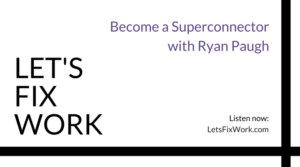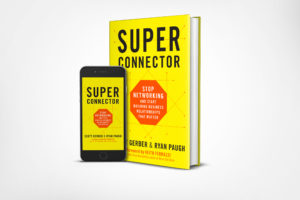 When kindred spirits come together in a community, ideas and dreams blossom, passion gets amplified, accountability and empowerment surges, and the problems? Well, they become less daunting. In this episode, Laurie has a great conversation with a dear friend, a cult legend in the online-community building world, Ryan Paugh. Laurie and Ryan share how they met, what Ryan’s role is as a community builder, and why communities are essential in fixing the broken wheel that is work.
When kindred spirits come together in a community, ideas and dreams blossom, passion gets amplified, accountability and empowerment surges, and the problems? Well, they become less daunting. In this episode, Laurie has a great conversation with a dear friend, a cult legend in the online-community building world, Ryan Paugh. Laurie and Ryan share how they met, what Ryan’s role is as a community builder, and why communities are essential in fixing the broken wheel that is work.
In this episode:
-After a few years of working for corporate America, Ryan dove into the startup arena where he felt his passion for helping others would contribute more – this was his first step in his epic entrepreneurial journey.
-He created Brazen Careerist, which started out as a community for young professionals looking to find their place in the corporate world, where they can find answers and support from peers and other like-minded individuals. Long story short, Brazen was a success but eventually rebranded into an SAS technology product, which now serves as a peer-to-peer speed networking platform.
-As the product shifted away from its community-based roots, Ryan decided to walk a different path, but kept the burning passion to create better communities to support the next generation of highly driven leaders. He eventually became the co-founder and COO of The Community Company.
-Along with his business partner and co-author of Superconnector, Scott Gerber, they went on to build several outstanding communities for different organizations like business executives, youth leaders, and entrepreneurs such as YEC and the Forbes Council which includes the Forbes Human Resources Council, where members are encouraged to support, engage, and pick each other’s brains.
-Why did Ryan focus on community building? Well, everyone is part of a community in some way or another. We are social beings after all. Ryan believes that in being part of a community, we are given the opportunity to learn and impart vital lessons and experiences that nurture us into the people we are now. He says, “Give,” because he believes that there’s so much more to living than just getting something.
-Life and people aren’t meant to be boxed up in a simple transaction of give and take. We are much more complex than that – we have feelings, aspirations, and lives outside of the grind. This is why Ryan feels work has more… work to do in a community and culture building aspect. “You’re here to work and not to make friends,” is a typical feel at the office, but we DO need to build relationships in the workplace to grow into more productive members of the organization.
-Work is broken because it has been reduced to a means to an end; a paycheck for hours, nothing more than a simple transaction of, “if you do this, you get this.”
-Laurie shares Ryan’s sentiment that there’s more to work than just earning the money. That by limiting someone’s identity to a mere “bringer of bacon” a.k.a “corporate zombie” they have subsequently limited that individual’s potential to contribute to the organization’s greater cause. You see, when people see past the money and embrace purpose, when they are allowed to invest in things that they truly value, there’s a greater opportunity to create a positive and lasting legacy for others to follow or replicate.
-As a veteran community builder, Ryan believes that a good community must have an element of trust from the top-down. Ask anyone who knows Ryan and they’ll immediately say how helpful and encouraging he is despite his being a company co-founder. More than developing the products, organizations should look into nurturing its workers on a deeper level. People at the bottom makes the most impact, so it is important that they are set up for success throughout their stay in the company and, hopefully, even when they transition into something else. He dives deep into this “building relationships that matter” philosophy in his book, Superconnector.
-Ryan and Laurie are aware though that most people are still stuck in the old ways and find processes to be difficult to build – and even harder to implement – but it doesn’t have to be that way and we can all to do better.

You must be logged in to post a comment.